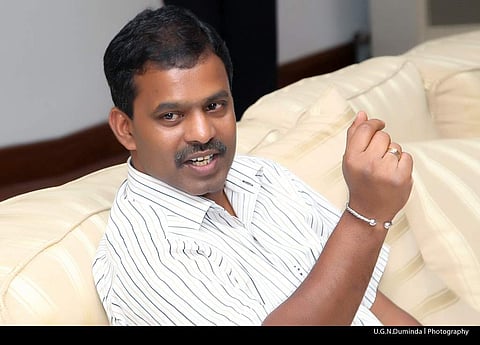

COLOMBO: Murugesu Chandrakumar, ex-MP and former member of the Eelam Peoples’ Democratic Party (EPDP), has floated an organization called Samooha Needhikkaana Makkal Amaippu or Peoples’ Organization for Social Justice (POSJ) to highlight and redress issues of social injustice among the Tamils of Sri Lanka.
Launched on Gandhi Jayanti day in war-devastated Kilinochchi district of the Wanni region in North Sri Lanka, POSJ hopes to meet a felt need for bringing out the multifarious issues of social injustice in Tamil society, which have been brushed under the carpet so far for the sake of maintaining “Tamil unity” to put up an effective fight against the Sri Lankan state on political issues.
Chandrakumar told Express on Tuesday that issues of social injustice continue to be brushed under the carpet even now, seven years after the war for a independent Tamil Eelam ended. The Tamil political elite, based on caste and class, continues to do so primarily to serve its selfish political interests. He felt that it is time a new organization was floated to arrest this trend, as letting matters drift will irreparably damage Sri Lankan Tamil society.
Unlike in India, where the liberation movement also included movements for social justice which were led by stalwarts like Mahatma Gandhi, B.R.Ambedkar, Periyar E.V.Ramasamy Naicker and C.N.Annadurai, in Sri Lanka, the Tamil movement has been purely political with little or no social justice content. The leaders of the Sri Lankan Tamil movement did not address social justice issues whether before the era of militancy, during militancy or after the end of militancy, Chandrakumar said.
According to him, this is due to the composition of the Tamil political elite. Typically, the elite comes from the well-heeled, well educated, Vellala caste with foreign connections. It is this caste-class combo which dominates membership in parliament and the provincial councils. Castes lower down in the hierarchy among Sri Lankan Tamils and Tamils of Indian Origin, have little or no place in the political structure except as followers and foot soldiers.
Chandrakumar points out that there is a regionalist hierarchy too, with the elite of the Jaffna peninsula being the top dogs, and the people of the Wanni districts, the Eastern Province and the Tamils of Indian Origin settled in the Wanni being the underdogs.
Social stratification was a fact even in the Liberation Tigers of Tamil Eelam (LTTE) despite the fact that the Supremo, Velupillai Prabhakaran, was a non-Vellala. According to Chandrakumar, most of the fighting cadres were from the lowers castes. A good chunk of them were from the even more under-privileged Indian Origin Tamil community.
And there was regionalism too. One of the reasons why Eastern Commander Karuna Amman quit the LTTE was discrimination against Eastern cadres by the Jaffna elite in the organization.
Chandrakumar says that the socially under-privileged groups continue to suffer from lack of opportunities. None of the existing institutions, be it the Central government in Colombo, the Northern Provincial Council, or the various political parties, cares for the underprivileged social groups.
He also said that one of the reasons why no politician or institution has done anything concrete and meaningful to uplift the lives of the ex-LTTE cadres (other than taking up an issue or two off and on) is the caste and class factor, Chandrakumar said.
The POSJ will highlight issues relating to women, especially women-headed houses and war widows. The Eastern Province, especially, has a very large number of war widows for whom very little has been done by existing institutions, whether governmental or political. Ex-women combatants, once admired or feared by Tamil society, are today seen as undesirables and are marginalized, because it is thought they will not fit into conservative Tamil families.
The 30-year war has only heightened traditional social disparities, says Chandrakumar. While a good number of the well-to-do upper caste Tamils had fled to safe havens in South Sri Lanka, India and the Western world, the lower caste hoi polloi, especially from the Wanni, had to stay put and suffer multiple displacement, destruction and death. All this only served to widen social and economic gaps.
With the latest Ezhuga Tamizh movement led by the Northern Province Chief Minister C.V.Wigneswaran, again highlighting only political issues, social justice does seem to be a far cry.
But Chandrakumar is hopeful that all is not lost. According to him, many young writers have come up with works on social justice issues and many websites discuss them, although the highly politicized mainstream Tamil media is still to take note of these issues.